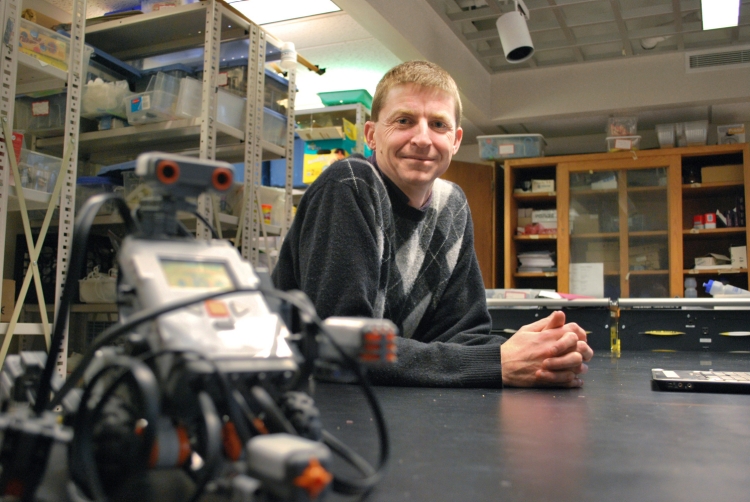
By
Lynch School of Education Associate Professor G. Michael Barnett has been named the 2012 Massachusetts Professor of the Year by the Carnegie Foundation for the Advancement of Teaching and the Council for Advancement and Support of Education (CASE) in recognition of his teaching excellence and positive influence on the lives and careers of students.
Barnett is the second Lynch School faculty member in the last four years to win the statewide honor, along with Associate Professor Audrey Friedman, the 2009 awardee. The Carnegie/CASE Professor of the Year award is the only national program that recognizes excellence in undergraduate teaching and mentoring.
Barnett’s focus is on urban science education, promoting STEM (science, technology, engineering, math) fields to undergraduate education majors, and the youngsters they student-teach, through projects that utilize technology and link to real-world issues.
In his teaching, Barnett uses innovative tools such as indoor hydroponic vertical farms, where BC undergraduates work with their K-12 students to grow vegetables and then sell the produce at their own farmer’s markets. Through the project, which takes the participants from seed to market, his students learn about topics such as environmental science, engineering, botany, nutrition, sustainability and economics. Barnett has set up vertical farms in Boston Latin School, Russell Elementary in Dorchester, New Mission High School in Hyde Park, Saint Columbkille Partnership School in Brighton, and on campus at BC’s greenhouse.
Earlier this fall he received a $250,000 National Science Foundation grant to launch Boston’s largest indoor hydroponic gardening youth initiative. [see separate story]
“I try to get everybody excited about science, from K-12 students to college students to the general public,” said Barnett, who joined the Lynch School’s Department of Teacher Education, Special Education, and Curriculum and Instruction in 2002.
A self-described “recovering astrophysicist” from Kentucky, Barnett caught the teaching bug when he was tapped to teach a lesson about the moon to “immensely inquisitive fifth-graders” while he was working on his PhD in astrophysics.
Barnett, who holds a master’s degree in physics, went on to earn a doctorate in instructional systems technology with an emphasis in science education from Indiana University. His work has been published in the International Journal of Science Education, Urban Education and The Journal of Career Development and is forthcoming in the International Handbook of Research on Environmental Education.
Lynch School Associate Dean Alec Peck nominated Barnett for Professor of the Year, calling him an “exceptional educator” and “one of the most creative instructors in the university and...especially dedicated to his work with undergraduate students. I am confident he has had a transformative effect on hundreds of students and that the next generation of STEM teachers could not have a better influence on their personal and professional lives.”
“Rock star” and “the most genuinely inspiring role model of effective instruction” are just some of the words students used to describe Barnett in his nomination papers.
“[Professor Barnett] loves educating people on how to teach science. A self-proclaimed technical geek, he consistently encourages his students to find ways to put new technologies in the hands of their students, including some that I have incorporated in my high school classroom,” wrote former student Andrew Trossello, who now teaches chemistry and biology at a Boston-area high school.
Barnett has twice received a Boston College Instructional Design and eTeaching Services’ Teaching with New Media Award for his innovative use of technology in the classroom.
Barnett is known for building collaborative relationships with other departments within Boston College as well as with urban public and private schools, and other groups, all with an eye toward making science education the best it can be.
Associate Professor of Geophysics Alan Kafka, a collaborator of Barnett’s, said, “With science education faculty like Mike Barnett, we are able to break down the barriers that typically exist between science departments and science education faculty and make a real difference in the careers of future teachers and the children they will teach.”
Barnett has dedicated countless hours to Saint Columbkille Partnership School, where his work has been described as “instrumental in the transformation of [the] school’s science curriculum.”
“I like being interdisciplinary,” explained Barnett. “The real world doesn’t work in silos.”
Barnett says he is always looking for ways to engage students. “You have to reach students where they are,” he said. This philosophy has led him and his research team to develop a mobile app called “Touch Tree” that allows users to identify trees and their ecological value.
His teaching is about more than educating future science teachers: He wants to get non-science majors interested in learning about science.
A grant project to revamp his undergraduate course for non-science majors has recently been designated “recommended for funding” by the National Science Foundation. In the course, students will drop data eggs in some 50 public locations throughout the Greater Boston area, including Boston, Cambridge, Newton and Waltham, to collect information on air quality. The students’ reports will be publicly available via touch foil interactive screens set up within the community. For example, a bookstore in Waltham will display the findings on their window.
“The point of this project is to get the science out into places where you usually don’t see it,” said Barnett.
“If I can get non-science majors interested in how science works and reading the New York Times Science section, then I consider that a success,” he added.
Other Boston College winners of the Massachusetts Professor of the Year honors have been Professor of Economics Richard Tresch (1996) and Rattigan Professor of English Emeritus John Mahoney (1989).



